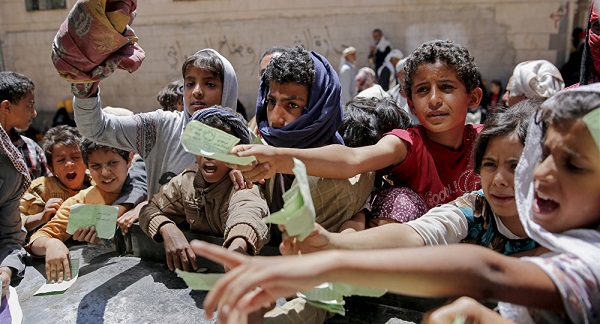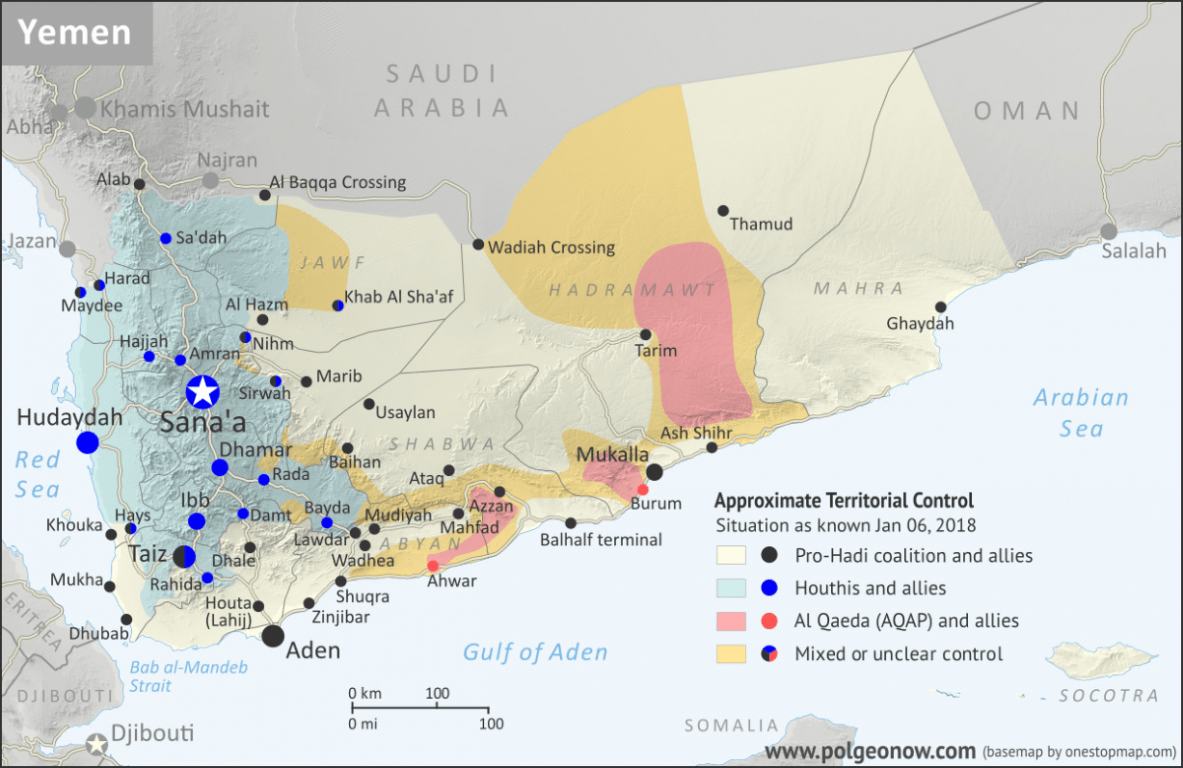Yemen Losing Fight Against Famine
October 25, 2018 | Expert Insights

UN Humanitarian experts have warned that Yemen faces the world’s worst famine in 100 years. Saudi Arabian forces have been called upon to stop the blockade of goods, including food, to Yemen. The blockade is one of Saudi’s tactics in the war against the Iran-backed Houthi rebels that are trying to overthrow the internationally recognised Yemeni government.
Background
The modern Republic of Yemen is a relatively new state. In the early 20th century, the country was divided between the Ottoman and British empires in the early twentieth century. South Yemen became a communist country and North Yemen remained true to its roots. In 1990, the two regions merged.
Yemen, one of the world’s poorest countries, has been devastated by the war between forces loyal to the internationally recognized government of President Abdrabbuh Mansour Hadi and those allied to the Houthi rebel movement. The Yemen Civil war began in 2011 with the Arab Spring protests that led to the fall of the then President Ali Abdallah Saleh on charges of corruption and economic grievances. Hadi, his deputy minister at that time, took over the region. However, the increasing political instability in Yemen paved the way for the Houthi, representing the Shiite minority to take over the territory.
A military intervention was launched by Saudi Arabia in 2015, to influence the Civil War in Yemen. A two-year Saudi-led campaign has damaged infrastructure and caused a shortage of food and medicine. Reports have also emerged that there are players within Yemen who actively sponsor terrorism by funding activities conducted by ISIS.
Since 2015 the country has been engaged in a civil war in which the exiled government, backed by Saudi Arabia, is trying to defeat the Houthi group aligned with Iran.

Analysis
The U.N. humanitarian chief says the conflict in Yemen has left 8.4 million people dependent on emergency food assistance and 75 per cent of its 22 million people requiring some form of aid. Officials estimate that 3.5 million to 4 million more people could become severely food insecure in the months ahead. According to the UN, 3 million Yemenis are malnourished, including 1.1 million pregnant women and more than 400,000 severely acutely malnourished children.
Throughout the civil war, civilians have borne the brunt of the conflict. Over 10,000 people have been killed, while survivors battle cholera and diphtheria epidemic, famine and a severe humanitarian crisis.
UN advocates are calling on a military coalition led by U.S. ally Saudi Arabia to halt air strikes that are often missing targets and killing civilians while decimating villages. The action is contributing to what the UN says could become “the worst famine in the world in 100 years.”
Saudi Arabia, backed by the U.S., the U.K. and France, is using air strikes and a blockade of goods, including food, as it supports Yemen’s internationally recognized government against the Iran-backed rebels. Saudi Arabia and the United Arab Emirates, two countries that have helped fuel Yemen’s conflict, have given the UN one of its biggest donations for relief in aid history: $930 million to the Yemen Humanitarian Fund. UN Secretary-General António Guterres has expressed his “deep gratitude” to MBS, as the Saudi crown prince is known, but he called for the kingdom to abide by the rules of war and lift the blockade on Yemen’s ports, which is choking off food sources.
Saudi Arabia’s ambassador to the UN’s European headquarters in Geneva, Abdul Aziz Al-Wasel, said that the kingdom had written to the UN High Commission with its criticisms of the global organization’s speaking out against Saudi action in the war, arguing that the organization’s recent findings did not include reports that Iranian-backed Houthi militias detained and looted vessels carrying aid.
A major conflict-related factor affecting the availability of food is the loss of household income. The World Bank estimates that Yemen’s economy has contracted 50 per cent since the start of the conflict, with at least 600,000 jobs lost, mainly in agriculture and the service sector. Another major factor is the depreciation of Yemen’s currency, the rial, which has lost 47 per cent of its value against the U.S. dollar in the past year, including 20 per cent since September.
Causes aside, the consequence of the crisis is an alarming deterioration in Yemen’s food security. Experts warn that the fight against famine is being lost. Many cases of families eating leaves have already been reported. Beyond mere survival, 2 million children across Yemen have no access to education, according to the UN children's agency UNICEF.
Assessment
Our assessment is that if urgent steps are not taken to address the humanitarian crisis in Yemen, the effects of the civil war will be felt for generations after it ends, and could plunge millions into an irreversible state of dire poverty and ill health. We believe that if a strong message is sent to combatants about the importance of observing the laws of war in regard to civilians, a humanitarian crisis of this scale could be avoided in future.
Read more:








Comments